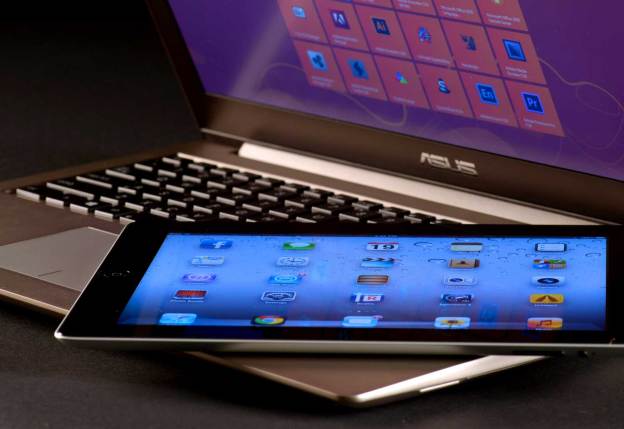
The rise of the tablet has been a surprise. While now an accepted addition to a world once dominated by PCs, the initial unveil of the iPad was met with skepticism from many. Would people really go for a device without a keyboard? They have, and are, and will – but why?
That’s an important question for many companies in the PC business. While Microsoft tries to convince the world that its new touch-optimized operating system isn’t a dud, computer sales have experienced the greatest downturn in history. If this trend is to be stopped, or even reversed, the lessons taught by tablets must be understood.
The eyes buy
Computing is a visual experience. The marvel of seeing a screen react to our input is what makes a computer engaging. Yet, at some point over the last decade and a half, the companies that build PCs forgot this. They found they could sell more units if prices were lower, so they slashed the display, knowing that most buyers wouldn’t have a chance to judge it before buying.
That strategy seemed sound from an accountant’s perspective, but it bred weakness into the computer. When the iPad and other tablets arrived with beautiful IPS panels, the blemish that is a cheap laptop display became apparent. Then, Apple poured salt in the wound by placing Retina in a device that starts at $500.

Some PC manufacturers have responded and improved quality with surprising speed, but they’re playing catch-up. Laptops sold for $600 should have IPS displays. They should have them yesterday. Unfortunately, change may come too late; neglect of the display has caused manufacturers to prioritize other costly components.
Features don’t sell
Windows 8 is the most robust version of Microsoft’s operating system ever released. It has so many features that most reviews don’t even name a quarter of them for fear of putting readers to sleep. And still, Windows 8 has been ill received by customers, and how can this be?
What manufacturers rarely understand is that most features don’t matter to most people. Here at Digital Trends, we care about features. But we’re also professional writers with a love for electronics and the activities they make possible. To others, including many of our readers, the particulars of this or that feature aren’t so dire.
The reality is that most consumers don’t care about face recognition, third-party software, thumbprint readers, custom docks, and the plethora of other extras added by manufacturers. None of these “features” make laptops better. They only confuse consumers and add cost.
The experience is the top priority
If features don’t sell, what do? According to Apple, it’s the experience. And since Apple’s currently the leader by far in the tablet segment, the company probably knows what it’s talking about.
… PC manufacturers have operated for decades with little regard for the end-user experience.
Want proof? Look no further than the iPad. When it was revealed, some outlets predicted it would flop like every tablet that came before. Yet 1.7 million iPads are sold every week. Why? Because it’s portable, powerful, and intuitive in a way its predecessors were not – and all of which leads to an excellent user experience.
PC manufacturers, on the other hand, are filling the market with heavy, bulky, confusing convertibles, most of which aren’t selling well because most aren’t enjoyable to use.
No room for cynics
Computers are complex. They have cores and drives and USBs, most of which aren’t understood by the average consumer. This has created a cynical business culture at major PC manufacturers that focuses on marketing instead of innovation.
I’m reminded of graphs posted on the website of a well-known gaming laptop manufacturer several years ago. The graphs compared dual-core with quad-core performance, and guess what? The bar for the quad was twice the size of the bar for the dual! Of course, the truth is not so simple, but the company hoped users wouldn’t find out until after they’d bought a laptop.

This approach worked because all the major manufacturers used similar tactics. But nothing lasts forever. Smartphones and tablets are now teaching consumers that specs aren’t important. And if specifications aren’t important, they can no longer be used to confuse (and up-sell) customers. PC manufacturers will have to reform their old ways and refocus on building excellent, cutting-edge computers that provide a seamless experience.
But don’t just take our word for it. Though the latest numbers show the PC industry took a huge hit last quarter, two companies – Asus and Lenovo – managed to hold ground. These companies build some of the most interesting and innovative laptops sold today, yet also offer affordable pricing. In other words, they provide what consumers want, and (surprise!) people are buying from these two companies.
Conclusion
Trends like touch and mobile are often portrayed like boulders rolling down a mountainside; inevitable, unstoppable, and destructive. In truth, these trends exist because smart people at powerful companies came up with new and creative ideas.
That’s good news for PC manufacturers because it means they aren’t helpless. They too have smart people and a lot of cash, and that provides a choice. Will laptop makers learn these lessons and pursue new ideas? Or will they continue down the same path until it leads them off a cliff? That story is still being told.
Editors' Recommendations
- When the iPad is a better computer than my PC
- I abandoned my iPad for an Android tablet and didn’t hate it
- I ditched my iPad Pro for an Android tablet — here’s why
- The most innovative tablets of 2022
- I used my phone and tablet to become an artist – here’s what happened


